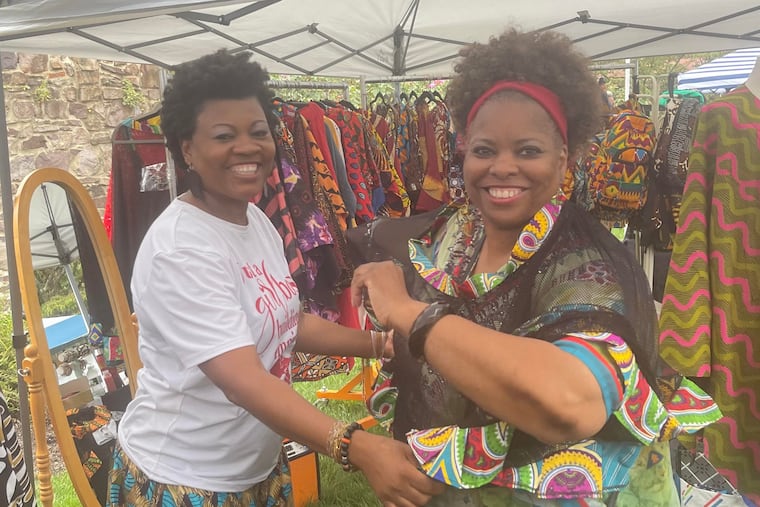African Diaspora Festival celebrates identity and culture at Underground Railroad Museum
Despite the rain, people gathered for an African Diaspora Festival sponsored by the Underground Railroad Museum in Eastampton, Burlington County, to celebrate heritage and culture.

When rain threatened early Sunday morning, some of the volunteers for the African Diaspora Festival in Burlington County wondered whether they should cancel the event.
But Louise Calloway, the 92-year-old founder of the Underground Railroad Museum in Eastampton, brushed aside the doubters.
“We’ve got to go on with the program,” she said.
The rainy weather actually retreated for most of the day, and hundreds of people wandered through the festival area at the Historic Smithville Park grounds, home to the Underground Railroad Museum.
» READ MORE: Burlington County will honor Louise Calloway, founder of its Underground Railroad Museum
There was music and dance, including drumming by Sangue Mbacké, a master drummer from Conshohocken who is originally from Senegal.
Mbacké, who uses his first name, Sangue, as his professional name, said he loved the idea of Black people from America and the Diaspora getting together to share music, culture, and ideas.
“I feel like people can learn something new in their own culture,” he said.
For many Black Americans who have little knowledge of which countries in Africa they came from, he said the drumming experience may be new, but it is steeped in generations of bloodlines.
Rowena Harvey, a Black American woman who lives in Willingboro, echoed that sentiment. She said she attends as many ethnic festivals as she can. And not just those celebrating African heritage. She recently went to a Brazilian festival and saw that there were elements of African heritage on display there, too.
“I love festivals. I love culture and exploring,” she said.
Harvey lamented that Black Americans lost direct contact with their African roots because when they were enslaved, very few records of the countries they came from were kept and passed down. Today, only through DNA testing companies, have Black Americans begun to have a general idea of their ethnicity from Africa.
“We are the only ethnic group that doesn’t have an opportunity to know the specific country we came from,” said Harvey, an events manager.
Harvey later met up with Bernice Fynn-Addo, a businesswoman originally from Ghana, who was selling African clothing, jewelry, purses, and backpacks at the festival.
Fynn-Addo said festivals such as the African Diaspora festival allow Black people from America and Black people from African countries to get to know each other and avoid stereotypes the groups sometimes have of each other.
“I was in college and was driving a car and someone asked me, ‘Oh? You can drive? I didn’t know you had cars in Ghana.’ I thought you rode horses,” Fynn-Addo said. “And this was in 2013.”
She couldn’t remember if the person who said that to her was Black or white, but she said she has heard similar comments from Americans of both races.
Fynn-Addo said many Black Americans only know negative stereotypes of African people from television or movies that depict Africa as a place with starving children or corruption. On the other hand, she acknowledged that some African immigrants to the United States come here with a distorted picture of Black Americans acquired through movies and media reports that portray Black Americans as thuggish rappers with their pants below their hips or as criminals.
Once a week, Fynn-Addo said, she hosts Facebook Live programs and explains the meanings of the symbols on the jewelry she sells, most of it from Ghana and Kenya.
“I want people to understand their culture.” she said.